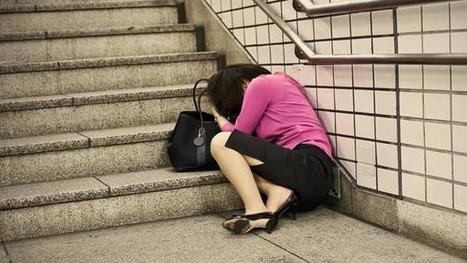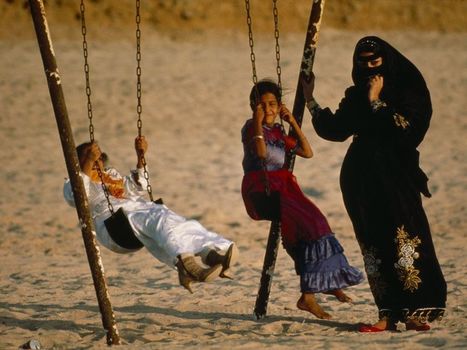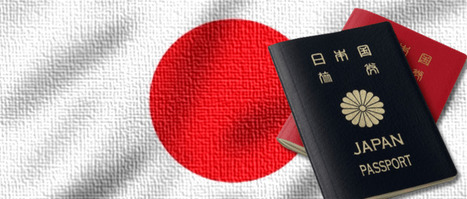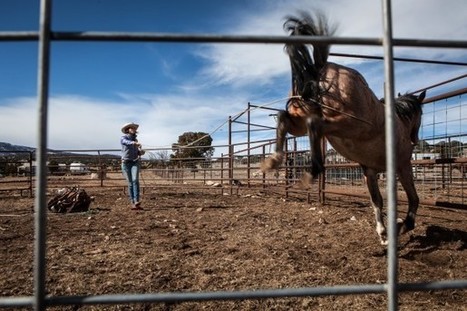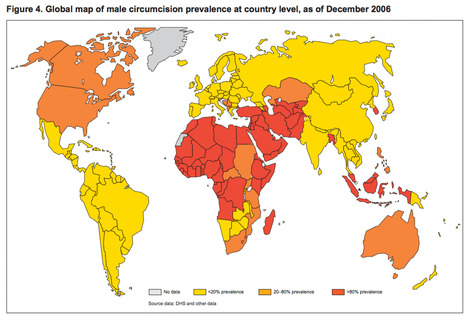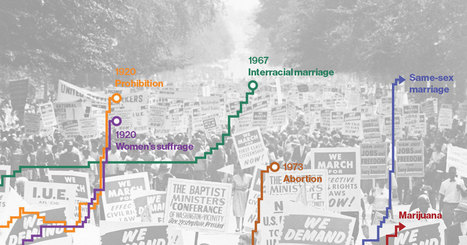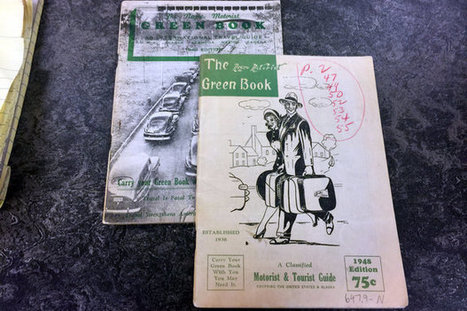"The Japanese don’t sleep. This is what everyone – the Japanese above all – say. I first encountered these intriguing attitudes to sleep during my first stay in Japan in the late 1980s. Daily life was hectic; people filled their schedules with work and leisure appointments, and had hardly any time to sleep.
Get Started for FREE
Sign up with Facebook Sign up with X
I don't have a Facebook or a X account
 Your new post is loading... Your new post is loading...
 Your new post is loading... Your new post is loading...

Taylor Doonan's curator insight,
March 23, 2018 12:42 PM
This article is about Hijabs and it talks about the religious aspect of Hijabs versus the cultural aspect. It states that the hijab is a sign of modesty, which is not a strictly Muslim ideology, but is addressed in many religions. It also talks about how the hijab is not directly mentioned in the Quran. It states that the hijab is almost as much a cultural symbol instead of a religious one and talks about countries with laws about hijabs and how women should dress.
Nicole Canova's curator insight,
March 24, 2018 9:19 PM
Hijab is the expression of a concept of modesty. It is not specific to one religion, nor is it specific to one region. This expression of modesty is encouraged, but not clearly defined, in Islam's holy texts; rather, it is informed by personal or cultural notions of what it means to be modest. Hijab's association with extreme or radical Islam has led to heated debates in Western nations about whether or not it is acceptable for people to express hijab, with many people citing "national/public security" as a reason to ban certain coverings.
David Stiger's curator insight,
October 31, 2018 11:29 AM
The geography of the hijab is important for Westerners to understand. Only two countries, Iran and Saudi Arabia, require women to dress by the strict standards of hijab. The vast majority of Middle Eastern, North African, and Muslim countries around the world do not have a legal dress code for women. Some laws and cultural traditions encourage women to dress modestly. Other countries like Tunisia, Turkey, and Syria (all predominantly Muslim) had laws to restrict women from wearing the hijab in order to be more secular and modern. Many other countries, like Pakistan and Jordan, do not have any laws on the book concerning if women should or should not wear a hijab. These countries understand that it is a personal choice regarding privacy, reputation, and personal faith. Like many religious precepts, the concept of hijab is open to interpretation. As a result, a Westerner can safely assume that having a large Muslim population, or a significant number of Muslims operating in a government, will not lead to a takeover of Sharia law or oppressive fundamentalist codes of behavior. Instead of being afraid of the unknown and making assumptions about entire societies, Westerners should find out more and be exposed to how diverse and broad differing cultures and societies can be.

Richard Aitchison's curator insight,
March 29, 2018 8:51 AM
Interesting to see how the Japanese handle citizenship differently than most of world and America. Japan is mostly a homogeneous culture and from seeing there citizenship laws one can tell why. A foreigner must live there for 10 years and display "good conduct" which no one really knows what it is and also prove to be Japanese enough in culture. It will be interesting to see how this continues today in a world that keeps becoming more and more global. All over the news we see constant backlash about countries that do not want to accept more immigrants or give certain rights to citizens, however you never really hear of the Japanese. The Japanese have many cultures that they can keep alive with mostly a homogeneous population and most likely helps cause less violence and less arguments among its politics. Imagine if here in America they searched your house to see if you were American enough? I think that might be headline news by the night.
tyrone perry's curator insight,
April 24, 2018 10:35 PM
If you want to move and live in Japan and attain a citizenship be ready to give up your current citizenship and go on one heck of a rollercoaster. Japan is one of the toughest places to get a citizenship. For one you have to live there for at least 10 years. Then the government can and will come to your home to inspect it from the types of pens you have there to the kid of pictures you hang on your wall. The main thing is the Japanese government wants you to really adapt to their culture. Very few are naturalized, out of 12446 that applied only 9400 were accepted. But the good news is, is it is free compared to 550 in the US and 1200 in the U.k.
Benjamin Jackson's curator insight,
December 13, 2015 5:18 PM
the idea that funerals should be festive is an idea with a large history. it is also, i think, a very good idea. many people already get together after a funeral and drink and talk about the good times they had with the dead person, and it helps with a sort of closure. 
Sarah Cannon's curator insight,
December 16, 2015 5:24 PM
I've never heard of this type of burial traditions. The typical burial that I hear about and experience are the old, wake and funeral the day after the wake. I've also heard of funerals that are held in New Orleans, when someone died the people of New Orleans paraded down the street singing and playing happy music. This was a celebration of there life. Wakes and funerals that I'm used to are always sad and depressing and held at a church and funeral home then the deceased are to be buried at a cemetery. In this article, caskets are designed differently, as you can see in the photo above. Some caskets are in the shape of a shoe, fish, car, or even a camera. Interesting way to celebrate the deceased. 
James Piccolino's curator insight,
February 8, 2018 6:44 AM
I have actually seen this before, in the travel documentary "The Moaning Of Life", star Karl Pilkington (also star of previous travel documentary "An Idiot Abroad") travels the world to explore other cultures to see how they deal with issues differently than the rest of the world. In episode 5 "Death" he travels here and even gets his own custom coffin made, a double coffin for him and his long time girlfriend in the shape of a Twix bar package. This cultural attitude is an interesting one to say the least, especially compared to the way others interpret death.
Chelsea Martines's curator insight,
September 10, 2015 9:35 PM
Americans have been said to be the least vacationing people compared to many other countries workers. But, according to the article, 40% choose to do this, and do not take off as many vacation days as they can. Many Americans would like to, but feel pressured to keep up with the American stereotype and keep being 'hard-working' citizens. BBC did a poll on their Facebook page to find this out, and many Americans said that their bosses as well do not make it easy to take time off sometimes, restricting their vacationing days, although at a federal level, they should be able to do so easily. 
Kevin Nguyen's curator insight,
September 16, 2015 1:07 PM
It is amazing to look at American society and their struggles with taking days out of work on vacation. In this competitive economy, people need to be hard working to keep their jobs and excel in their field of work. Taking days off usually would be wise in order to refresh and rejuvenate from the long working hours. However, people are fearing that their work load will be too overwhelming to take on upon their return if they chose to take time off. One of my managers at work (JCPenney) would stay passed her scheduled time to make sure the men's department would be clean and organized before she leave. She usually does this after she clocked out and will stay for 3-4 hours after. I can definitely relate this situation to the article. The fact that most Americans working at a job that they have tons of responsibilities for will feel stressed and overwhelmed if they take vacation days.
Tracy Harding's comment,
September 22, 2015 10:15 AM
You need to include global impact and personal thoughts.
|

Colleen Blankenship's curator insight,
February 19, 2018 1:48 PM
What is your take on this? What are the positives? Negatives?

Ruth Reynolds's curator insight,
December 10, 2016 2:15 AM
Some simple cultural differences between American and Finns. Now how do these apply to Australians.? Good conversation starter for intercultural understanding.

asli telli's curator insight,
August 15, 2015 1:34 AM
Also applies to unfortunate Turkey w/her recent urban transformation wave...
BrianCaldwell7's curator insight,
March 16, 2016 3:31 PM
While it might make economic, nutritional, and environmental sense, I'm sure that many are squeamish at the idea of insects primarily because in violates many deeply engrained cultural taboos. The main reasons listed in the video for promoting the production and consumption of more insects:
Questions to Ponder: Would you be willing to try eating insects? How do you think this idea would go over with your family and friends? What cultural barriers might slow the diffusion of this practice?
Tags: food, culture, diffusion, cultural norms, economic, food production, agriculture.
Shane C Cook's curator insight,
May 27, 2015 9:05 AM
This superhero is more than just something to bring joy to children in Pakistan. This hero empowers women to think they can be strong like the Burka Avenger. 
Chris Costa's curator insight,
November 30, 2015 9:51 AM
This is an awesome, heartwarming story, and I highly recommend people to watch the trailer for the show offered on the website- it seems very cool, and like something kids will actually want to watch (unlike a great deal of educational television). For a nation that is plagued by such a great deal of bigotry and gender inequality- with female infant mortality rates contributing to a gender distribution of 108 men to 100 women- it is so good to see a program such as this being released from Pakistan. Young Muslim women are so deprived of positive and powerful female role models, allowing for the continued systematic abuse and mistreatment of women in many parts of the Middle East, including Pakistan. This show looks promising, from both a critical and humanitarian perspective, although I fear for the lives of its creators and that its showing will be suppressed in the very nations that need it the most. Terrorist organizations and religious extremists fear education and empowerment more than any army, as only those two factors can truly combat these movements effectively, and they will show no mercy should they ever be given the chance to cease the production of this program. I applaud its creators for their bravery, and hope that they are able to get their message across. |




